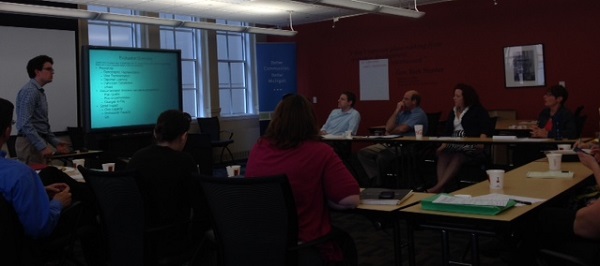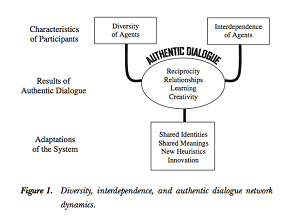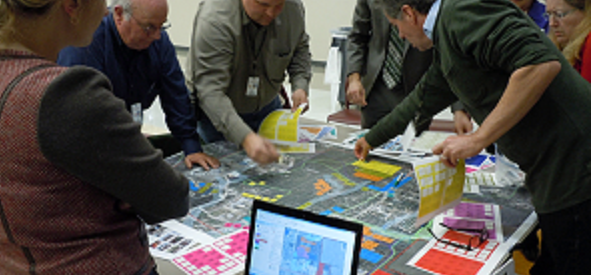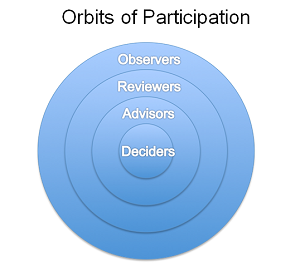
Community engagement leaders met on May 20th at MML’s Lansing office.
Effective civic engagement is a key strategy for successful placemaking. It’s important communities recognize that placemaking is both about the physical place AND the making of it. With strong engagement, governments can improve decision-making and residents are more informed, invested, and have greater support for local initiatives. As the Knight Foundation’s Soul of the Community reports, the more people feel connected to their community, the more economically vital that place will be.
In an effort to enhance civic engagement across the state, the Michigan Municipal League received a small grant from the Mott Foundation through the Michigan Fitness Foundation to develop engagement best practices, evaluation tools, and to explore the development of a Michigan-based community of practice.
On May 20th, a small group of planners and civic engagement experts from across the

From Dr. Goodspeed’s presentation: Innes & Booner’s diagram of collaborative planning.
state came together at the Michigan Municipal League’s Lansing office. Robert Goodspeed, Assistant Professor of Urban Planning at the Taubam College of Architecture and Urban Planning at the University of Michigan, presented academic perspectives on civic engagement, engagement structures, and evaluation techniques and led the discussion around practitioner experiences, best practices, and the potential development of a community of practice.
Challenges in Engagement
The group identified the many challenges of quality engagement in planning. A few include:
- It’s hard to do – Engagement takes time, relationships, facilitation skills, and patience.
- It’s hard to fund – Engagement is often costly and more labor intensive than top-down planning strategies and can be difficult to document and evaluate.
- Residents don’t often understand planning and local government processes, which they can find frustrating during engagement meetings.
- There is often a lack of communication between elected leaders and city planners, therefore causing stress, distrust, and less effective engagement.
Good Engagement Practices
Despite many challenges, leaders in the room also shared best practices they’ve come across through their engagement experiences. A few include:
-
From Dr. Goodspeed’s presentation: Engagement Technology For All’s levels of participation in engagement.
Encourage organizational values in engagement and ensure internal support – The organizing entity has to value engagement and must have the capacity to do successful engagement activities. Facilitators must be trained effectively and staff must be supported in their engagement efforts.
- Empower residents – Residents should viewed as partners, rather than clients. Staff must take time to build positive relationships with stakeholders and ensure they’re prepared for all meetings.
- Engagement should be throughout project ideation, formation and implementation – Staff should ensure residents and stakeholders are involved throughout the planning process, up through implementation.
- Document success & failure and make changes accordingly – There’s no “right” way to engage, so communities should learn from experiences, document lessons, and plan for the future. Given challenges to fund engagement practices, staff should do their best to record both qualitative and quantitative engagement data and take time to reflect on all meetings.
Building a Community of Practice

From Dr. Goodspeed’s presentation: Residents engage in computer-aided planning through Austin Sustainable Place Projects.
Meeting participants also explored the option to build a Michigan-based community of practice. As brainstormed in the meeting, a potential community of practice would:
- Offer a space for practitioners (elected officials, planners, and others) to connect, share experiences, and support each other
- Organize trainings on a variety of topics, including agenda-development, facilitation, and dealing with challenging residents
- Promote and feature great community engagement projects focused on Michigan, but also around the world
- Advocate for better engagement efforts to local, state, and federal leaders
- Seek engagement funding opportunities and offer assistance in documenting results of engagement activities
Although the group is still in the visioning phase of its work, the Michigan Municipal League is working with partners to develop a greater support and education network for leaders across the state. Please contact me directly at [email protected] for more information or to get involved.
Supporting Research
- Massachusetts Institute of Technology: Places in the Making: How Placemaking Builds Places and Communities
- The Business of Government: Public Deliberation: A Manager’s Guide to Citizen Engagement
- University of Minnesota’s Center for Democracy and Citizenship : Creating a Culture of Learning: A Framework for Neighborhood Public Work
- Institute for Local Government: Planning Public Engagement: Key Questions for Local Officials
- Project for Public Spaces: Learning from Knight’s Soul of the Community, Leaning Toward the Future of Placemaking
- Alliance for Children and Families: Practices for Enhancing Civic Engagement Outcomes
